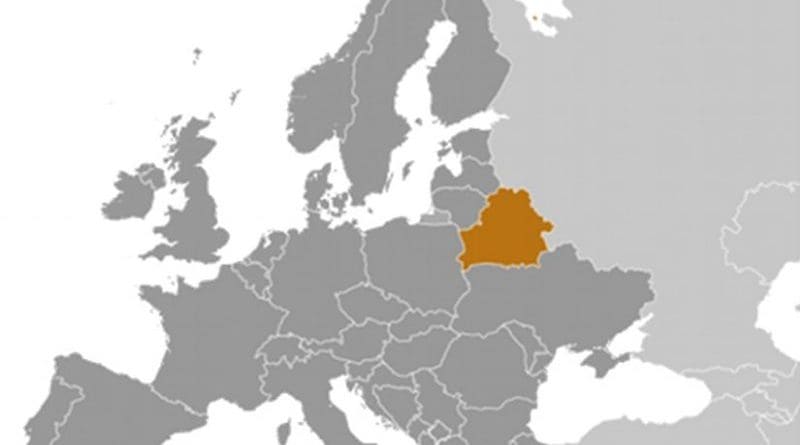Belarus: Leading Rights Defender Detained
Belarusian authorities should immediately free a leading human rights activist, Ales Belyatsky, whom police detained on August 4, 2011, in Minsk on politically motivated allegations of tax evasion, Human Rights Watch said today. The investigation against Belyatsky, who is head of the Belarusian human rights group Viasna and vice-president of the International Federation of Human Rights in Minsk, is a thinly veiled tactic to imprison a prominent human rights defender and should be discontinued, Human Rights Watch said.
At approximately 5:20 p.m. on August 4, financial police dressed in civilian clothing detained Belyatsky on Minsk’s Freedom Square. They told him that he was being detained as part of an investigation into financial crimes and that they had a warrant to search his apartment.
“Belyatsky’s arrest is a clear case of retaliation against him and Viasna for their human rights work,” said Hugh Williamson, Europe and Central Asia director at Human Rights Watch. “It’s the latest in a long series of efforts by the government to crush Belarus’s civil society.”
Viasna is one of the leading human rights organizations in Belarus that provided legal and financial assistance to support political prisoners and their families following the 2011 pro-democracy protests in Belarus. The authorities withdrew Viasna’s registration after it monitored the 2001 presidential elections, and have routinely denied it registration since. Under Belarusian law, participation in the work of a non-registered association constitutes a criminal offense.
A Viasna staff member told Human Rights Watch that Belyatsky is being held in relation to article 243 part 2 of the Belarusian Criminal Code, “tax evasion on a particularly large scale,” which is subject to penalties of up to seven years in prison and confiscation of all property.
Belyatsky’s arrest appears to stem from the use of his personal bank account in Lithuania to support human rights work in Belarus. Belarusian authorities have refused to register on a national level all but one of the independent human rights organizations in the country. As a result, an unregistered group cannot open a bank account in the organization’s name in Belarus or meet the terms set out in financial regulations.
“In reality what the Belarus authorities are doing to civil society and Belyatsky in particular, amounts to entrapment,” Williamson said. “First they push human rights defenders to work in the margins of the law, deny them capacity to function, then when they seek to continue to work in the only way they can, the authorities use criminal law, pretending that it has nothing to do with their human rights work. Any intelligent observer knows different.”
On August 5, Viasna issued a public statement expressing regret about the role that Lithuanian authorities may have unwittingly played in spurring the investigation against Belyatsky. Media reports said Lithuanian authorities had released bank account information for a large number of Belarusian nationals, including Belyatsky, in response to an official request from Minsk.
Later on August 5, the Lithuanian deputy justice minister issued a statement confirming these reports. The deputy minister said that under a bilateral agreement on legal assistance on family, civil and criminal matters, such information must be shared upon request from the government that is a party to the agreement. According to the statement, Lithuania has shared with Belarusian authorities the bank account information for as many as 400 Belarusian nationals during 2011.
But the deputy minister also said that because the Belarusian government has used the information against the political opposition, Lithuania is suspending further legal assistance to Belarus.
“The Belarusian government’s abuse of information provided by Lithuanian should serve as a warning to all governments about legal cooperation with states that so blatantly flout the rule of law,” Williamson said. “Other governments should follow Lithuania’s lead and stop sharing information that may result in persecution of the civil society by Aleksandr Lukashenka’s government.”
After the financial police detained Belyatsky, they took him to his apartment, where in the presence of his wife and adult son, they conducted a two-hour search. Police confiscated materials related to Belyatsky’s work, as well as his and his son’s computers.
Police then briefly took Belyatsky to Viasna’s office, then to the Department of Financial Investigations for questioning. They took his wife and son to the family’s summer house, conducted a search there, and confiscated another computer.
Police also searched the Viasna office in absence of staff members, who were not allowed into the office, a Viasna staff member told Human Rights Watch.
“They didn’t confiscate any of our office computers simply because they were already confiscated months ago, during the authorities’ raids on human rights groups,” a Viasna staff member told Human Rights Watch. Police also sealed Viasna office equipment and furniture.
On August 4 and 5, Belyatsky was being held at the Department of Financial Investigations and, Viasna reported, was being questioned. His case investigator allowed Belyatsky to meet briefly with his wife.
On the evening of August 5, the investigators said Belyatsky will remain in detention until he is formally charged. Under Belarusian law, the authorities can keep Belyatsky in custody for 10 days, before formally charging him or releasing him.
The prosecutor’s office summoned Belyatsky in February and issued him an official warning that his human rights work was “in contradiction with the Belarusian law.” Belyatsky lodged a complaint against the warning seeking to have it dismissed as unlawful but on June 20, the Central District Court of Minsk declared the warning lawful. An appeal hearing on the complaint is scheduled for August 11 before the Minsk City Court.
“Belyatsky’s arrest is yet another sign that the Belarusian government is going back to the darkest days of repression,” Williamson said.

